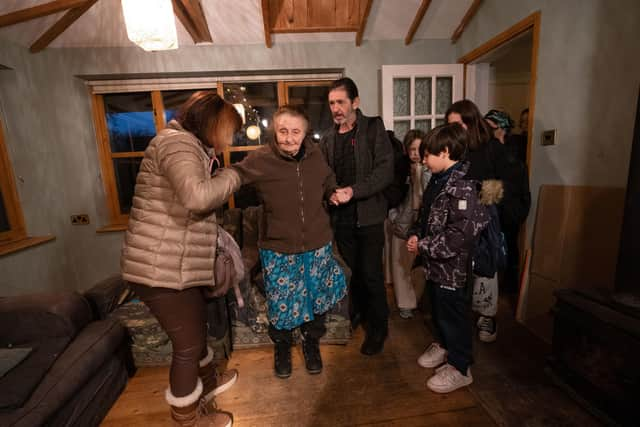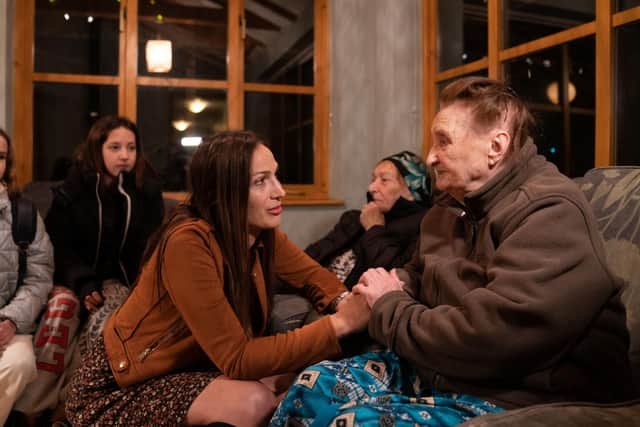Homes for Ukraine is Britain at its best – Jim McConalogue
Even though the Government is technically the architect of the scheme, it is clear from the policy that it is not simply the duty of the state to step in and care for others – but rather civil society is stepping up.
Advertisement
Hide AdAdvertisement
Hide AdFollowing the invasion of Ukraine, the sponsorship scheme will mean that Ukrainians who have been forced to flee their homes have a place of safety here in Britain.


Charities, businesses and community groups are able to sponsor Ukrainians who do not have already established family ties to the UK.
The scheme is attempting to match people with sponsors.
The very fact that ministers are looking to families to shelter tens of thousands of Ukrainians reminds us of that important word so often forgotten by government: families.
Nor should it be forgotten that the public helped initially to raise more than £200m in two weeks for the Disaster Emergency Committee’s Ukraine humanitarian appeal.
Advertisement
Hide AdAdvertisement
Hide Ad

The role of civil society in aiding Ukraine reasserts the value of an active society – above and beyond the capabilities of the state or market.
As with the experience of a pandemic, we are learning (yet again) that the state cannot realistically pay for and govern all spheres of activity.
Notably, it cannot realistically be a primary caregiver in all crises and situations. It is a symbol of our times that the disorientated political left calls only for more state and local authority intervention, without acknowledging the good will and actions of civil society.
The fundamentalist theory of the ‘free market’ is itself tainted in the crisis. For there is no such thing as a free market which turns on the dubious money of barbaric regimes.
Advertisement
Hide AdAdvertisement
Hide AdHowever, all civil society depends locally on a moral free market where the benefits and proceeds of private enterprise sit alongside our families, churches, charities and schools, enabling a greater common good to be defended.
If it is civil society that can help us answer the plight of Ukrainians, it is that same fighting voluntary spirit which must be allowed to respond to our other core challenges in society.
It is that sense of civic duty which revitalises democracy by enabling moral communities to come together – through friendly societies, charities, themselves dependent on strong families – to enable individuals to flourish, often outside the scope of the state.
The strong families and communities of the country must be free to respond both morally and practically to the public demands which the state has long been unable to satisfy.
Advertisement
Hide AdAdvertisement
Hide AdAs our state institutions have grown, they have long squeezed out voluntary associations and diminished the spirit of personal responsibility on which a vibrant civil society depends.
Through the continued limitation of opportunities for personal idealism in the service of others, the old expectation that the state should act in all situations has eroded the sense of personal responsibility and mutual obligation on which a resilient civil society otherwise relies.
It is not an accident of government policy which makes us look to families first to help the Ukrainians.
That most fundamental social fabric – a conglomeration of kinship, love, friendship, care and education, protection, tradition and identity – is the single most moral and humanising institution in history.
Advertisement
Hide AdAdvertisement
Hide AdIt is often in the family that people first learn to exercise self-restraint and the expression of care for others on which a tolerant and free society rests.
Perhaps after the pandemic and the Ukraine crisis, we might learn some lessons about our own national life: it is often those families, rather than the state, that enable us to exercise a greater social responsibility. It also goes well beyond the family.
Certainly, a free society rests, to a considerable degree, on voluntary restraint, formed out of strong families in which children are raised to be good citizens.
But when combined with the vigorous efforts of voluntary associations in all their different forms, we help to create a society in which people work with others to achieve shared ends and promote our common humanity.
Dr Jim McConalogue is the director of Civitas.
Advertisement
Hide AdAdvertisement
Hide AdSupport The Yorkshire Post and become a subscriber today. Your subscription will help us to continue to bring quality news to the people of Yorkshire. In return, you’ll see fewer ads on site, get free access to our app, receive exclusive members-only offers and access to all premium content and columns. Click here to subscribe.
Comment Guidelines
National World encourages reader discussion on our stories. User feedback, insights and back-and-forth exchanges add a rich layer of context to reporting. Please review our Community Guidelines before commenting.